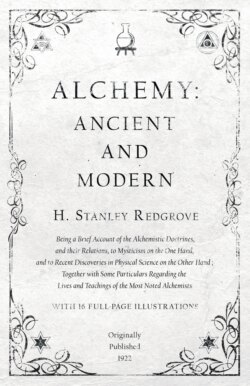Читать книгу Alchemy: Ancient and Modern - Being a Brief Account of the Alchemistic Doctrines, and their Relations, to Mysticism on the One Hand, and to Recent Discoveries in Physical Science on the Other Hand - H. Stanley Redgrove - Страница 16
На сайте Литреса книга снята с продажи.
Opinions of other Writers.
Оглавление§ 8. We shall here quote the opinions of two modern writers, as to the significance of Alchemy; one a mystic, the other a man of science. Says Mr. A. E. Waite, “If the authors of the ‘Suggestive Inquiry” and of ‘Remarks on Alchemy and the Alchemists’ [two books putting forward the transcendental theory] had considered the lives of the symbolists, as well as the nature of the symbols, their views would have been very much modified; they would have found that the true method of Hermetic interpretation lies in a middle course; but the errors which originated with merely typographical investigations were intensified by a consideration of the great alchemical theorem, which, par excellence, is one of universal development, which acknowledges that every substance contains undeveloped resources and potentialities, and can be brought outward and forward into perfection. They [the generality of alchemists] applied their theory only to the development of metallic substances from a lower to a higher order, but we see by their writings that the grand hierophants of Oriental and Western alchemy alike were continually haunted by brief and imperfect glimpses of glorious possibilities for man, if the evolution of his nature were accomplished along the lines of their theory.”7 Mr. M. M. Pattison Muir, M.A., says: “. . . alchemy aimed at giving experimental proof of a certain theory of the whole system of nature, including humanity. The practical culmination of the alchemical quest presented a threefold aspect; the alchemists sought the stone of wisdom, for by gaining that they gained the control of wealth; they sought the universal panacea, for that would give them the power of enjoying wealth and life; they sought the soul of the world, for thereby they could hold communion with spiritual existences, and enjoy the fruition of spiritual life. The object of their search was to satisfy their material needs, their intellectual capacities, and their spiritual yearnings. The alchemists of the nobler sort always made the first of these objects subsidiary to the other two. . . .8
